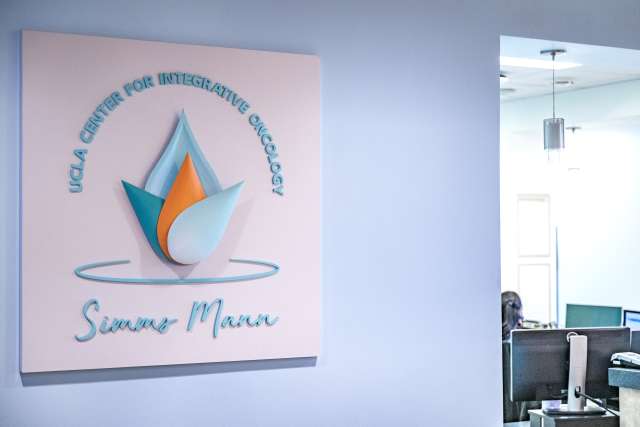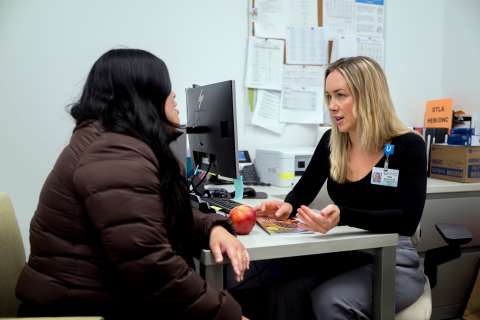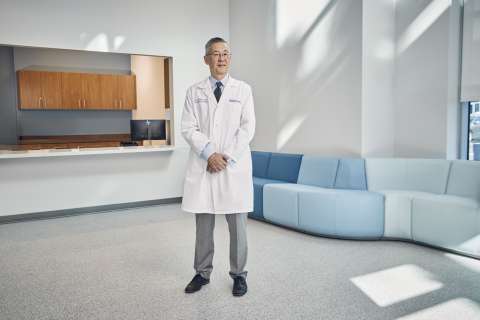When the father of Victoria Mann Simms, PhD, was diagnosed with cancer in the early 1990s, integrative care was virtually non-existent. Cancer was considered a physical disease and treatments focused exclusively on the physical body. The mental, emotional and spiritual challenges of the diagnosis weren’t part of the conversation.
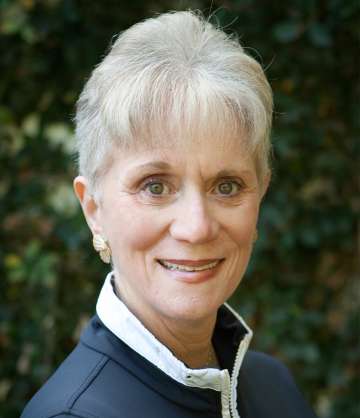
“Many of the medical practitioners looked at my father’s disease but did not treat him as a whole person,” says Dr. Mann Simms.
As a psychologist, she knew that body and mind were inextricably interconnected, and that serious medical challenges required tending to them both. Dr. Mann Simms complemented her dad’s treatment with an array of experts and activities to lift his spirits — yoga teachers, spiritual leaders, and social gatherings with friends and family.
“Even though these modalities didn’t improve my father’s condition, they helped him enjoy a better quality of life and his connection to his loved ones up to the end,” she says.
Dr. Mann Simms’ love for her father and passion for whole-person wellness is at the heart of the Simms Mann UCLA Center for Integrative Oncology, which in 2024 is celebrating 30 years of providing free psychosocial, spiritual and nutritional support to people with cancer and their families. In recent years, the center has expanded to offer services in all 20 of UCLA Health’s oncology clinics, from Orange County to San Luis Obispo, with plans to further extend its outreach in the coming years.
The integrative center is “a gem in our crown,” says UCLA Health’s director of cancer services, Barb Jagels, RN, MHA.

“UCLA is world-famous for its science. UCLA is world-famous for having top doctors and clinicians, nurses, nurse practitioners, laboratory technology, imaging technology. And the Simms family wanted UCLA to have an equally reputable program offering emotional support and alternative, complementary, integrative therapies,” Jagels says. “I’ve never seen something like this, where there is a broad, deep and expansive program dedicated to the emotional and integrative support of patients, and it’s free, thanks to institutional support and philanthropy. That’s incredibly unique in America. It’s incredibly unique in academic oncology. And it’s incredibly unique here at UCLA.”
Early days
The center was originally developed in 1994 to support women with gynecologic cancers, with funding from Dr. Mann Simms’ father, movie theater mogul Ted Mann. After he passed away in 2001, Dr. Mann Simms and her husband, Ronald Simms, wanted to build on that legacy, says John Glaspy, MD, MPH, a professor and physician of hematology/oncology at UCLA Health and medical director for the Simms Mann Center.
“They had larger integrative oncology visions for the center,” says Dr. Glaspy, who advocated for the Simms’ approach to UCLA Health leadership.
By 2009, the Simms Mann Center didn’t just offer counseling and support groups, it was an integrated part of an individual’s treatment plan, no matter which UCLA Health clinic provided their care. And it went beyond counseling to include spiritual services, mindfulness, qigong, nutrition support and wellness education.
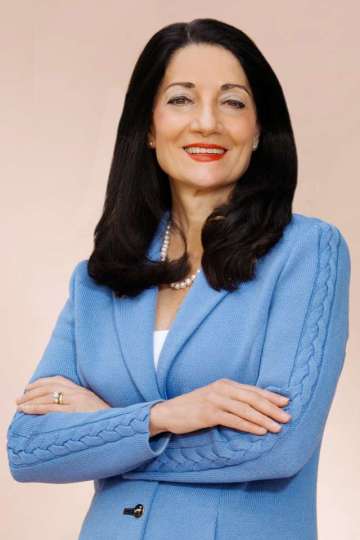
When Johnese Spisso, MPA, UCLA Health president and CEO of the UCLA Hospital System, joined UCLA in 2016, she embraced the Simms’ vision, Dr. Glaspy says.
“She was a nurse; she was active in caring for patients personally, and I think that changes her perspective and gives her a closer view of why this is important,” he says. “She also saw how this could help the institution differentiate itself as a cancer-care entity.”
The power of integrative care
When an individual is diagnosed with cancer at UCLA Health, providers from the Simms Mann Center are immediately integrated into that patient’s treatment plan — an approach that supports the patient, their family and the physicians providing their care.
“Integration is important for several reasons, but the main one is that, if you separate things, something becomes dominant, and the other thing is recessive,” Dr. Glaspy says. “Building a structure where that happened would send a message that’s wrong. Both physical and emotional care are equally important.”
Addressing psychosocial needs from the outset also reduces stigma and eliminates obstacles to receiving this kind of care, says Simms Mann Center Director Shannon La Cava, PsyD.

“It should be part of the entire approach to care because it’s all parts of the person, not just the cancer,” she says. “We’re looking at the impact on a person when there is a diagnosis, and we’re looking at it from a wellness standpoint.”
Integrative care also improves communication between patients and providers. It helps patients make treatment decisions and feel more empowered doing so, Dr. La Cava says.
An integrative approach supports physicians, as well, adds Jagels.
“Simms Mann is providing the latest, most up-to-date information in their interactions with patients and participating in the rounds with physicians,” she says. "So the entire care team understands what everyone is seeing, hearing and making adjustments to the patient’s care plan based on real-time information.”
Teddy Seraphine-Leonard, chair of the Simms Mann Center’s advisory board, has experienced the power of integrative care firsthand, several times over.
When she was diagnosed with a form of non-Hodgkin lymphoma in 1983, she chose an alternative-care approach, focusing on meditation and energy healing. When her husband was diagnosed with head and neck cancer in 2013, the Simms Mann Center helped coordinate his care, which enabled him to get back to his hobby of working on vintage cars, even during treatment. And as her daughter faces metastatic breast cancer, Dr. Glaspy and the Simms Mann Center are supporting her care with alternative treatments.

“I can’t tell you what a big gift the Simms Mann Center is to cancer patients, to cancer families, to myself,” Seraphine-Leonard says. “That’s why I’ll do anything to support the center and help it grow and go forward in the future, so that all patients can benefit from this care that is provided free of charge.”
Future of the Simms Mann Center
With Simms Mann Center clinicians embedded in all UCLA Health oncology clinics throughout Southern California, patients can access psychosocial support – including counseling, spiritual care, nutrition guidance and psychiatry – in their neighborhood and in their language. Now the organization is focused on further expanding its services and reach.
Among its new endeavors is building a studio space in Santa Monica. Equipped with a demonstration kitchen, the studio will host in-person and virtual cooking classes, as well as yoga classes, breath work sessions and social events.
The Simms Mann Center is also expanding its digital footprint, with a robust new website and library of digital offerings. Dr. La Cava envisions the site as a resource not just for UCLA Health patients, but for anyone “searching online in the middle of the night who wants to get some information and feel a little more confident and comfortable.”
“I see this digital experience as being an extension of the care team that can provide patients and families with a sense of empowerment and control over their healing,” adds Dr. Mann Simms.
The center’s digital expansion includes forays into apps, augmented reality and wearable technology, Jagels adds, as telehealth and virtual experiences become the new norm.
Always an innovator
Progressive from the start, the Simms Mann Center has become a national model for integrative cancer care, says Dr. Mann Simms, something she always hoped for.
“That’s why many years ago I advocated for the center to develop a training program to create the pipeline for the next generation of integrative cancer care professionals,” she says, adding that training is available for interns, residents and practitioners in psychosocial care, along with chaplaincy, psychiatry and palliative care. “Alumni of the center’s training program now practice in cancer centers and health systems around the country.”
But the heart of the work remains the people — the patients and practitioners. It’s about not feeling alone, Dr. La Cava says.
“Some of the symptom management and just the impact of having cancer or surgery or treatment can make someone feel very alone,” she says. “And talking about it with somebody or getting connected with another person going through a cancer diagnosis, it normalizes things. It can feel like you’re the only person going through this issue, or this very strange thing is happening to you. Then you get into a group and everyone’s talking about this very strange thing. And then it’s not very strange anymore, and it’s easier to manage.”
As Seraphine-Leonard puts it, when you or a family member receives a cancer diagnosis, “It’s like you fall down into this black hole … and there’s no ground under your feet. You don’t know where to go. And the people at the Simms Mann Center are like this beacon of light.
“They are the lighthouse on that dark sea that is cancer,” she says. “They’re the lighthouse saying, ‘Come this way. We’re going to walk you through this.’ And that, to me, is priceless.”

